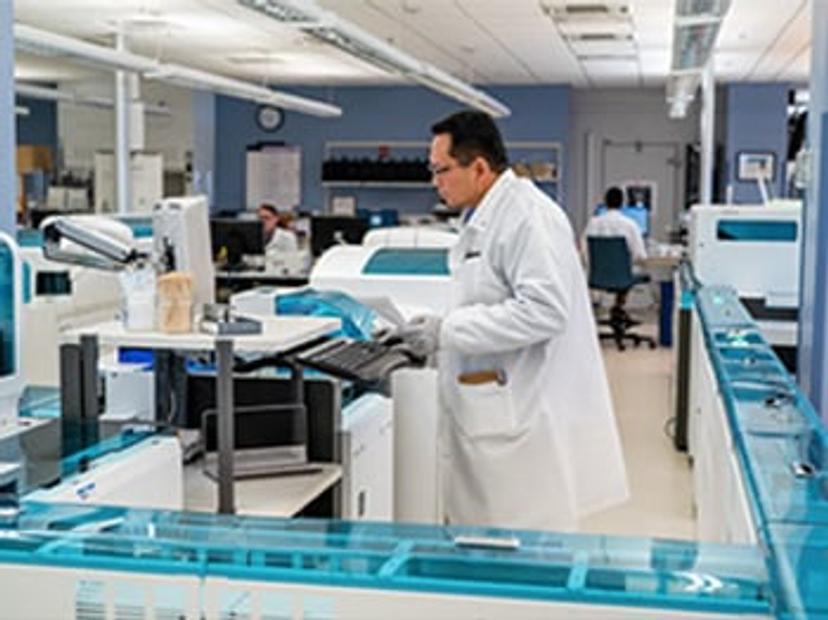The value of LC-MS for endocrinology investigations in the clinical lab
Director of the clinical chemistry laboratory at Yale New Haven Health, Dr. Joe El-Khoury, shares how his team are developing new mass spectrometry-based methods for patient diagnostics
25 Apr 2023

Clinical chemistry laboratories use analytical chemistry principles and techniques to measure the concentration of molecules of interest—such as hormones and drugs—in blood, urine, and other biological samples for the purpose of aiding a diagnosis or monitoring treatment, often using tests that are cleared or approved by the United States Food and Drug Administration (FDA) or other agencies. Currently, most of these FDA-registered tests come in the form of immunoassays, which use antibodies or antigens to measure the concentration of specific molecules in a solution, but there are inherent shortcomings to this approach.
Immunoassays are popular because they are easy to implement and provide rapid results, but there are some cases when these automated solutions are either not available or suitable. In areas such as therapeutic drug monitoring, toxicology, and endocrinology, issues with interference and cross reactivity are well documented. In these situations, more and more laboratories are turning to chromatographic and spectrometry-based techniques like liquid chromatography-mass spectrometry (LC-MS) to provide reliable and accurate diagnostics for their patients.
In this SelectScience® article, we speak with Dr. Joe El-Khoury, director of the clinical chemistry laboratory and the clinical chemistry fellowship program at Yale New Haven Health, to hear how his team are encouraging the use of LC-MS for endocrinology and other routine applications in the clinical laboratory.
The gold standard
“In our field, LC-MS is considered as the gold standard for analyzing small molecules in biological fluids,” says El-Khoury. “We turn to it when we can’t really perform something in an automated manner using immunoassays or other approaches in a hospital setting.”
Unlike the FDA-registered immunoassays, individual laboratories generally need to develop and optimize LC-MS methods for their own instruments and samples. El-Khoury explains, “LC-MS is like cooking in the kitchen. You are developing your own recipe and it's quite unique, simply because it's a newer technology.”
El-Khoury and his team are working on introducing an LC-MS lab-developed test (LDT) to analyze levels of the steroid hormone testosterone in women and children, which will be particularly useful for patients who are under investigation for congenital adrenal hyperplasia and other conditions affecting hormone levels in the body.
Testosterone levels in men are routinely evaluated using immunoassays, but women and children typically have much lower levels of this hormone that are not always reliably measured using such tests. “LC-MS offers incredible sensitivity, and you get a much more reliable measurement than you would with immunoassays,” explains El-Khoury.
Testing of another steroid hormone, estradiol, in certain groups of patients also benefits from the higher sensitivity of LC-MS-based tests. “Estradiol immunoassays are useful for young women, who typically have high levels of estradiol,” says El-Khoury. “But when you are evaluating this hormone in children, men or postmenopausal women you need an ultrasensitive estradiol test—which are all done by LC-MS—so you can get down to those lower levels and make a firm diagnosis.” Ultrasensitive LC-MS tests also become vitally important when monitoring estradiol in women undergoing treatment for breast cancer, as estrogen receptor antagonists such as fulvestrant may interfere with estradiol immunoassays and confound accurate assessment in this context.
Testosterone and estradiol are just two of many steroid hormones present in the body, all of which are derived from cholesterol and are very similar to each other. As a result, an immunoassay for a particular steroid may be subject to cross-reactivity between different steroids that makes the test result less reliable. LC-MS has a much higher specificity for compounds of interest than immunoassays, making it easier to separate and accurately quantify closely related compounds.
To develop their laboratory’s testosterone assay, El-Khoury’s team used methods published by other researchers as a starting point. Conversations with those researchers provided extra information that helped El-Khoury and colleagues optimize the method for their mass spectrometer and samples.
LC-MS for endocrinology: Progress through partnerships

Support in developing new tests is also available from companies that provide LC-MS solutions. When El-Khoury’s team began developing an LC-MS test for Vitamin D they turned to Waters Corporation for advice. “We found a similar method for Vitamin D using one of Waters’ solid phase extraction columns and communicated with their scientists for more details. They were helpful in sharing the information they had,” says El-Khoury. “We made slight tweaks to their method, because not every mass spectrometer is the same, and then we validated it and have been using that method ever since.”
Any method for diagnostic testing that El-Khoury’s team develops needs to meet a certain level of proficiency testing, where the test’s performance is compared to that of similar tests from other laboratories in the US. But because the tests from different laboratories are not standardized there is still more variability present in the results than in the results of FDA-approved tests. For this reason, El-Khoury prefers to use FDA-approved test kits whenever possible, even though they are more expensive. “You’re paying for that extra check and extra quality provided by the FDA validation.” However, FDA-approval takes a lot of time, effort and money, when the need for many of these tests is already apparent. This is why El-Khoury’s team relies on LC-MS technology, because it gives their clinical lab the flexibility to develop reliable tests more rapidly, that are then validated per US regulatory requirements, prior to testing patients.
Fortunately, companies like Waters have started developing their own LC-MS-based products for diagnostic testing and taking them through the FDA for registration. This drastically reduces the amount of time, cost and effort involved in bringing a new test online in a laboratory.
The right expertise
Even when using a commercial LC-MS test kit, operating an LC-MS instrument still requires a higher level of expertise than immunoassays and other automated approaches for diagnostic testing. “We usually train people to operate automated immunoassays in about six weeks,” says El-Khoury. “But it generally takes up to a year for somebody to be comfortable with the operation of an LC-MS, from extraction to analysis, and being able to troubleshoot when anything goes wrong.”
Developing a new LC-MS method in-house requires personnel with even more expertise and experience. To overcome this hurdle, El-Khoury’s laboratory has dedicated staff members for development and training. Analytical chemists develop the new methods and then they work with medical laboratory scientists who help with the validation process.
Looking to the future
As a newer technology that is less automated, the turnaround time for LC-MS tests currently lags behind that of immunoassays and other diagnostic tests. So, for now, EL-Khoury’s team will continue to use immunoassays for the majority of their diagnostic testing workload, and focus on using LC-MS for situations where immunoassays or other tests are not suitable.
“Immunoassays are still going to be useful for those patient populations where it's known to be okay, for example, testosterone in men. At the moment, running all our testosterone samples through LC-MS would be too big a volume and slow down delivery of the results,” explains El-Khoury.
This situation looks set to change as new technological advances in LC-MS including automated components and real-time analysis tools become available. El-Khoury believes that, one day, LC-MS may even take over as the predominant approach for diagnostic testing. “It’s more straightforward to develop LC-MS assays because you don’t need to develop specific antibodies for each molecule of interest,” he says. “So, providing the turnaround time improves and the cost of automation is reasonable, LC-MS should work out cheaper and faster in the long run.”
